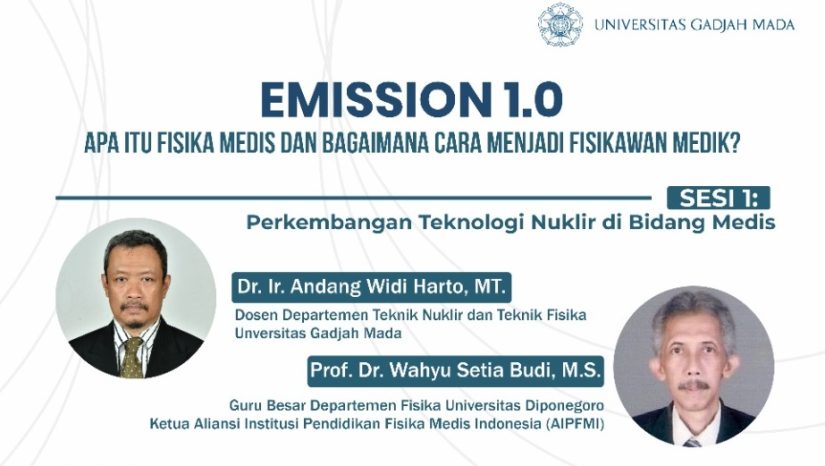
On Saturday, October 16, 2021, the Department of Nuclear Engineering and Physics Engineering UGM held the EMISSION 1.0 Talk Show. EMISSION itself is an activity that explores the ins and outs of the world of Medical Physics and its applications. In the first EMISSION activity, the theme brought was “What is Medical Physics and How to Become a Medical Physics?” and is intended for Nuclear Engineering students who will take specialization, high school students, and the general public. It is hoped that with this talk show, participants will get an overview of science and job prospects in the field of Medical Physics both at home and abroad from experienced speakers. In its implementation, the event was attended by at least 150 people who joined via Zoom and 60 people who joined via Youtube Live Streaming on the UGM DTNTF Channel. The backgrounds of the participants are very diverse, including high school students, high school teachers, physics, engineering and pharmacy students, medical physicists, and others from various cities in Indonesia. To date, the video talk show has been played 470 times.
The event began with remarks from the Head of the Department of Nuclear Engineering and Engineering Physics, Dr. Ir. Alexander the Great, ST, M.Sc. which explains that nuclear technology has many benefits in the fields of health, industry, agriculture, and others. With the increasing need for human resources who master nuclear technology for the medical field for both diagnosis and therapy, the Nuclear Engineering Undergraduate Study Program opens specialization in Medical Physics. He hopes that this talk show can provide as much information as possible for the participants. The event was followed by a question and answer session with the speakers. There were five speakers who discussed both with the moderator (Cecilia Nova Wijaya, TN 2018) and participants.
The first speaker is Dr. Ir. Andang Widi Harto, MT He started his explanation by explaining about nuclear reactions and comparing the energy produced from nuclear reactions with ordinary chemical reactions. plant and animal genetics. The advantage of using nuclear energy for sterilization purposes, for example, is that it can kill bacteria without leaving chemical residues. Likewise for radiotherapy applications, nuclear technology does not leave chemical residues like chemotherapy. According to him, the development of nuclear technology in Indonesia is still in the development stage. As an example, There is no nuclear power plant (PLTN). However, in future nuclear power plants are expected to contribute 900 GWe in the national energy mix, which is projected to be contributed by hundreds of nuclear power plants spread throughout Indonesia.
Nuclear engineering applications for medical dominate in the category of non-energy nuclear technology. According to BAPETEN, in the future, radiation equipment for medical use will be used up to district hospitals. For provincial-level hospitals, the number of these devices will be further increased considering the increasing number of cancer cases in Indonesia. The types of radiation used for therapy have also developed, not only photon radiation, but also protons ( Proton Therapy ), neutrons ( Boron Neutron Capture Therapy ), Heavy Ions ( Heavy Ion Therapy ), and others. Along with this fact, the need for Medical Physicists is also increasing. Nuclear Engineering graduates are expected to fill these HR needs.
In general, according to Mr. Andang, the challenges of implementing nuclear technology to address problems in Indonesia, among others, are related to the quantity of human resources and equipment. Second, another challenge is related to technology development, the challenge is towards increasing the efficiency and accuracy of medical nuclear systems (eg accelerators used for radiotherapy and cyclotrons for radioisotope production for radiodiagnostics). The third challenge is that medical physicists’ professional education is still limited. The last challenge, the development of nuclear technology is still dominated from abroad, where almost all radiotherapy and radiodiagnostic equipment are imported. Therefore, the Nuclear Engineering Study Program is expected to produce graduates who are able to develop the design of tools, components and supports,
In his closing statement , Mr. Andang explained how to remove the negative stigma of nuclear such as the atomic bomb. Among them is promoting that nuclear technology is safe by developing micro-reactors and non-energy applications, especially in the medical field which is very close to people’s lives. Mr. Andang also motivates participants who want to pursue this field because the job prospects are still broad.

The second speaker is Prof. Dr. Wahyu Setia Budi, S.Si. As chairman of the Alliance of Indonesian Medical Physics Education Institutions (AIPFMI), he first explained the definition of Medical Physics and Medical Physicists, where Medical Physics is the application of Physics to clinical medicine and the person who does this work is called a Medical Physicist. He further explained that the stages that must be passed to become a medical physicist are almost the same as the stages to become a doctor, considering that FM is also one of the recognized health workers in Indonesia. These stages are basic education, pre-clinical, and clinical. Nuclear Engineering and Physics students who want to become Medical Physicists must take specialization in Medical Physics with related elective courses, including Imaging Physics, Radiation Protection, Clinical Practicum, and others to pass a minimum of 144 credits. Furthermore, the third education is Medical Physics Professional Education / residency in a hospital for approximately 1 year. After completion, there is a competency exam to get recognition of competence and can apply for a Registration Certificate (STR). Currently, there are only 3 medical physics professional education at the University of Indonesia (UI), Diponegoro University (UNDIP), and Hasanuddin University (UNHAS). The selection to take part in this professional education is an administrative selection and a written exam. there is a competency test to get recognition of competence and can apply for a Registration Certificate (STR). Currently, there are only 3 medical physics professional education at the University of Indonesia (UI), Diponegoro University (UNDIP), and Hasanuddin University (UNHAS). The selection to take part in this professional education is an administrative selection and a written exam. there is a competency test to get recognition of competence and can apply for a Registration Certificate (STR). Currently, there are only 3 medical physics professional education at the University of Indonesia (UI), Diponegoro University (UNDIP), and Hasanuddin University (UNHAS). The selection to take part in this professional education is an administrative selection and a written exam.



